To protect your kidneys on a keto diet, prioritize hydration by consuming 2-3 liters of water daily to prevent dehydration and kidney stones. Moderate protein intake, especially if you have chronic kidney disease (CKD), aiming for 0.6-0.8 g/kg of body weight. Balance electrolytes by incorporating potassium and magnesium-rich foods like leafy greens and avocados, and consider sodium supplementation. Regular kidney function tests are essential to monitor any dietary impact. Consulting with healthcare professionals guarantees personalized advice, aligning ketogenic goals with kidney health. Discover more strategies to safely integrate the keto diet into your lifestyle.
Key Takeaways
- Stay well-hydrated by drinking 2-3 liters of water daily to reduce the risk of kidney stones.
- Moderate protein intake to 0.6-0.8 grams per kg body weight, especially for CKD patients.
- Regularly monitor kidney function through tests like serum creatinine and eGFR every 3-6 months.
- Balance electrolytes by consuming foods rich in potassium and magnesium and considering supplementation if necessary.
- Avoid high-oxalate foods and increase dietary calcium to lower the risk of calcium oxalate kidney stones.
Understanding the Keto Diet
Understanding the Keto Diet
Although originally developed for managing epilepsy, the ketogenic diet has surged in popularity for its potential benefits in weight loss and diabetes control. The keto basics involve a high-fat, moderate-protein, and very low-carbohydrate intake. Typically, the macronutrient distribution is about 60% fat, 35% protein, and 10% carbohydrates. This macronutrient balance aims to induce ketosis, a metabolic state where the body burns fat for fuel instead of carbohydrates.
Key fat sources in the ketogenic diet include fatty meats, fish, eggs, full-fat dairy, avocados, and certain oils like coconut and olive oil. These foods are vital to maintaining the high-fat requirements of the diet. Additionally, the diet restricts grains, starchy vegetables, and most fruits, which are high in carbohydrates that can disrupt ketosis.
Increasing omega-3 fatty acids from fatty fish and flax seeds can benefit heart health as you pursue ketosis.
Achieving and maintaining ketosis often involves monitoring blood ketone levels, ideally up to 3.00 mmol/L. However, it's important to note that this can increase acid production in the body, potentially leading to metabolic acidosis.
Despite its popularity, the long-term sustainability and health effects of the ketogenic diet, particularly concerning kidney health, remain subjects for ongoing research.
Kidney Health and Keto
Kidney health on a ketogenic diet requires careful attention to hydration, protein intake, and electrolyte balance.
Adequate hydration can help prevent kidney stones and dehydration, while managing protein intake is vital to avoid worsening kidney function, especially in those with chronic kidney disease.
Additionally, gradually reducing carbohydrate intake can ease the shift into ketosis and further support kidney health.
Monitoring potassium and phosphorus levels is essential to prevent serious complications in individuals with advanced kidney disease.
Regular monitoring of kidney function and urine composition is advisable, particularly for those with a history of kidney stones.
Hydration and Kidney Function
Proper hydration is essential for maintaining kidney function on a ketogenic diet due to the initial diuretic effect caused by reduced carbohydrate intake. As carbohydrate intake drops, the body loses significant amounts of water and electrolytes, making it imperative to stay adequately hydrated. This not only helps in preventing dehydration but also mitigates potential kidney strain.
Hydration tips are important for those on a keto diet. Aim to drink 2-3 liters of water daily to help flush excess ketones and reduce the risk of kidney stones. Monitoring urine color can serve as a practical hydration indicator; pale yellow suggests adequate hydration, while dark yellow signals the need for more fluids. Additionally, replenishing electrolytes lost through diuresis is essential to prevent symptoms like nausea, headache, and muscle cramps.
Some common hydration myths, such as the belief that all fluids hydrate equally, can be misleading. Water, along with electrolyte-rich fluids, is most effective in maintaining balance and preventing metabolic acidosis, which can negatively impact kidney function.
| Hydration Tips | Hydration Myths |
|---|---|
| Drink 2-3 liters daily | All fluids hydrate equally |
| Monitor urine color | Thirst is a reliable indicator |
| Replenish electrolytes | Coffee dehydrates |
| Adjust intake by activity level | Clear urine means over-hydration |
Adhering to these guidelines will support kidney health while following a keto diet.
Protein Intake Management
For individuals adhering to a ketogenic diet, managing protein intake is essential to safeguarding kidney health. Excessive protein consumption can place undue stress on the kidneys, particularly for those with chronic kidney disease (CKD).
To mitigate this risk, it is recommended to limit protein intake to 0.6-0.8 grams per kilogram of body weight per day, considerably lower than the typical keto range of 1.2-1.7 grams. This adjustment helps prevent glomerular hyperfiltration, a condition that can lead to a decline in kidney function over time.
Regular kidney function tests are important for those on a keto diet, especially individuals with risk factors such as diabetes or hypertension. These tests help monitor the impact of dietary protein on kidney health and enable timely dietary adjustments if necessary.
Incorporating a variety of protein sources is also fundamental. Favoring plant-based proteins over animal proteins can reduce the dietary acid load and the risk of kidney stones, which are exacerbated by high protein intake.
Ensuring adequate hydration further supports kidney function and helps manage the dietary acid load effectively. By carefully managing protein intake, individuals can maintain kidney health while reaping the benefits of a ketogenic diet.
Monitoring Electrolyte Balance
Managing protein intake is only one aspect of protecting kidney health on a ketogenic diet; another significant consideration is maintaining electrolyte balance. A ketogenic diet can result in increased losses of electrolytes, particularly sodium, potassium, and magnesium, due to reduced insulin levels and changes in body water balance. This necessitates careful monitoring and proactive strategies.
Symptoms such as fatigue, muscle cramps, and headaches, often termed "keto flu," may indicate electrolyte imbalances during the initial phases of the diet. To mitigate these issues, adequate hydration is vital, and incorporating electrolyte supplementation may be necessary. Additionally, dietary adjustments to include foods rich in potassium and magnesium, such as leafy greens and nuts, can support electrolyte balance.
Regular monitoring of serum electrolyte levels is essential, especially for individuals with existing kidney conditions, as these imbalances can pose serious health risks. Below is a table summarizing key electrolytes, their functions, and food sources that are keto-friendly:
| Electrolyte | Function | Keto-Friendly Food Sources |
|---|---|---|
| Sodium | Fluid balance, nerve function | Salt, bone broth, salted nuts |
| Potassium | Muscle function, heart health | Avocado, spinach, mushrooms |
| Magnesium | Muscle and nerve function | Almonds, pumpkin seeds, chard |
Maintaining electrolyte balance through supplementation and dietary adjustments is essential for kidney health during a ketogenic diet.
Risks for CKD Patients
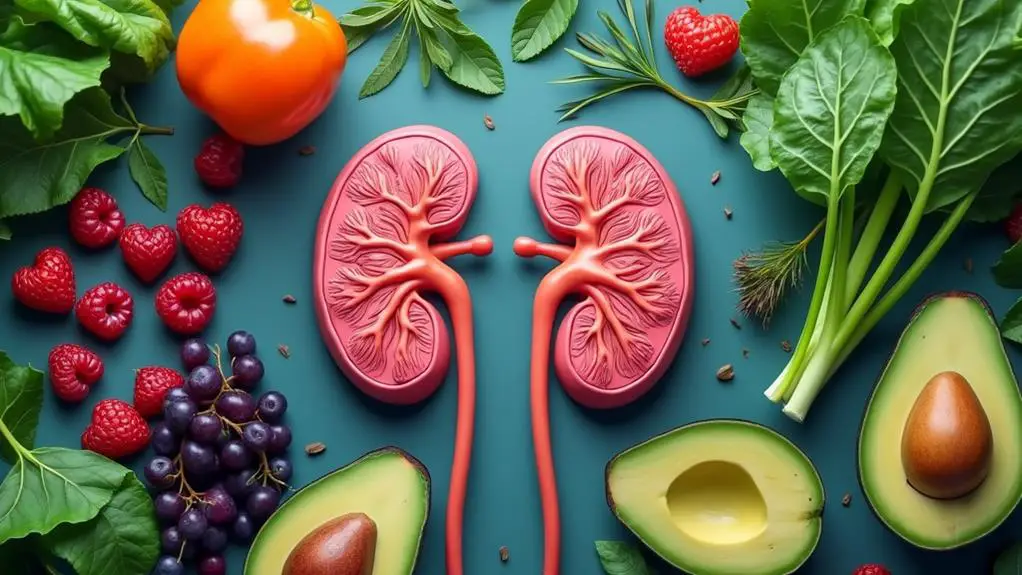
Steering through the complexities of a ketogenic diet can pose significant risks for patients with chronic kidney disease (CKD). The increased dietary acid load from high fat and protein intake inherent to the keto diet can accelerate the decline in kidney function.
For instance, while the keto diet can improve glycemic control and reduce reliance on diabetes medications, it brings unique challenges for CKD patients. Here are the critical factors to take into account:
- Dietary Acid Load: High levels of dietary acid from protein can strain the kidneys, exacerbating CKD.
- Kidney Filtration: Increased protein consumption leads to hyperfiltration, where the kidneys work harder, potentially worsening CKD.
- Protein Intake: The keto diet typically recommends 1.2-1.7 g/kg of protein, which is substantially higher than the 0.6-0.8 g/kg advised for CKD patients to slow disease progression.
- Kidney Stones: Raised urinary calcium excretion on the keto diet heightens the risk of kidney stones, particularly dangerous for those in Stage 3-5 CKD.
- Monitoring Nutrients: Proper management of potassium and phosphorus intake is essential to prevent complications and maintain kidney health.
Patients with CKD weighing the option of a ketogenic diet should consult healthcare professionals to tailor dietary plans that mitigate these risks.
Personalized advice can help balance the benefits of the keto diet while safeguarding kidney function.
Importance of Hydration
While maneuvering through the potential risks of a ketogenic diet for CKD patients, one cannot overlook the importance of maintaining proper hydration. Staying adequately hydrated is essential on a keto diet, particularly because the initial phase of carbohydrate restriction can lead to significant water loss and dehydration. This occurs due to reduced insulin levels, which promote sodium excretion.
As a result, aiming for at least 2-3 liters of water daily is advisable to help flush out excess ketones and reduce the risk of kidney stones, which are more likely to develop on a high-protein, low-carb diet.
Hydration benefits are numerous, especially for individuals with chronic kidney disease. Proper hydration supports kidney function by ensuring adequate urine output, which is vital for preventing the concentration of harmful substances such as calcium and uric acid in the urine.
Additionally, dehydration on a keto diet can lead to electrolyte imbalances, including deficits in potassium and magnesium. Hence, monitoring electrolyte intake and considering supplementation if necessary is important.
Practical hydration tips include drinking water consistently throughout the day, especially during meals and after workouts. This approach mitigates dehydration risks and supports overall kidney health while adhering to a ketogenic lifestyle.
Moderating Protein Intake
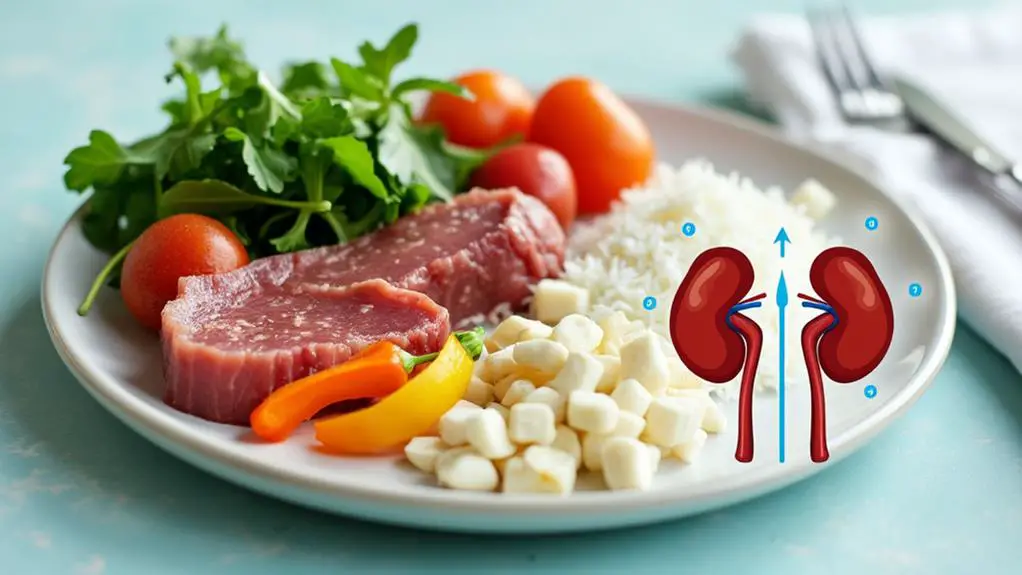
Moderating Protein Intake
Moderating protein intake is essential for individuals with chronic kidney disease (CKD) adhering to a ketogenic diet. Excessive protein consumption can exacerbate kidney stress, leading to potential damage. For those with CKD, a protein intake of 0.6-0.8 grams per kilogram of body weight per day is recommended, considerably lower than the typical keto diet recommendation of 1.2-1.7 grams per kilogram.
This moderation helps reduce the risk of increased urinary calcium excretion and kidney stones. Additionally, it is crucial to monitor for nutrient deficiencies caused by the restrictive nature of the keto diet, which can further impact kidney health. Regular consultation with healthcare professionals is also essential for safe adherence to the diet.
To effectively manage protein intake while supporting kidney health, consider the following practical advice:
- Balance protein sources: Integrate both animal and plant-based proteins into the diet. Plant-based proteins are often lower in phosphorus and potassium.
- Target lower protein intake: Aim for the CKD-recommended range to minimize kidney stress.
- Regular monitoring: Frequently check kidney function to detect early signs of stress or damage.
- Consult professionals: Work with healthcare providers or dietitians to tailor protein intake to individual needs.
- Reduce dietary acid load: Plant-based proteins can help in lowering the overall dietary acid load on the kidneys.
Balancing Electrolytes
Balancing electrolytes is a critical aspect of maintaining overall health on a ketogenic diet, particularly for individuals with chronic kidney disease (CKD). The ketogenic diet often leads to increased electrolyte loss, especially sodium, potassium, and magnesium, due to diminished insulin levels and changes in fluid balance. Ensuring adequate intake of these electrolytes is paramount to avoid complications such as dehydration and muscle cramps.
To counteract sodium loss, it is recommended to consume between 3,000-5,000 mg of sodium per day. Common sodium sources include broth, salted nuts, and pickles. Potassium supplements are also essential, with a daily intake of 3,500-4,700 mg to prevent muscle cramps and fatigue. Foods rich in potassium, like avocados and leafy greens, can be beneficial. Maintaining magnesium levels (300-400 mg per day) through supplementation or consumption of magnesium-rich foods like nuts and seeds can help mitigate symptoms such as insomnia and anxiety.
Regular blood work to monitor electrolyte levels is advised, ensuring the delicate balance necessary for CKD patients on a keto diet is maintained.
| Electrolyte | Recommended Daily Intake | Sources/Supplements |
|---|---|---|
| Sodium | 3,000-5,000 mg | Broth, salted nuts, pickles |
| Potassium | 3,500-4,700 mg | Potassium supplements, avocados, greens |
| Magnesium | 300-400 mg | Magnesium supplements, nuts, seeds |
Reducing Kidney Stone Risk
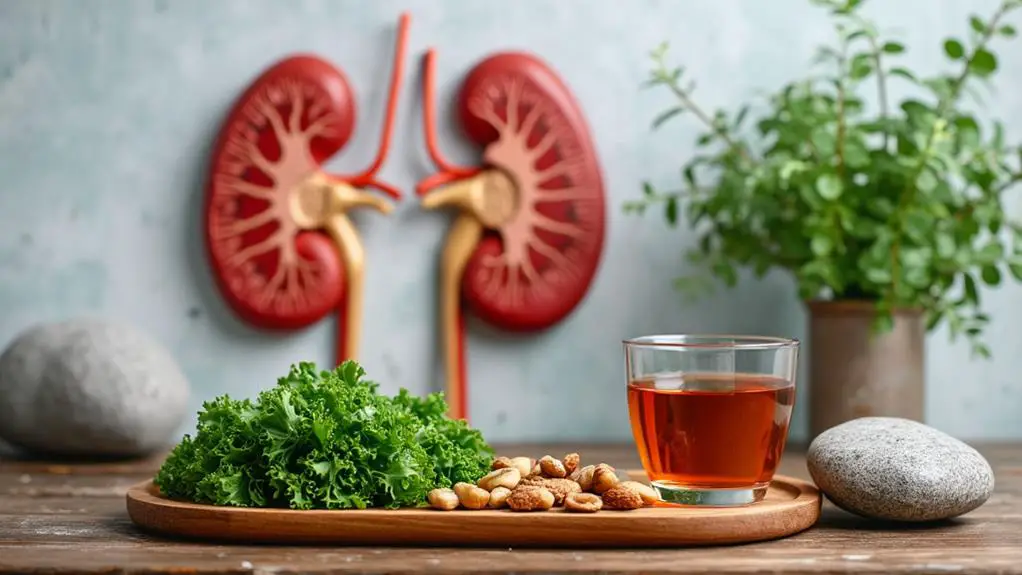
How can individuals on a ketogenic diet effectively reduce their risk of kidney stones? Staying well-hydrated, managing dietary intake, and making informed food choices are essential strategies. Dehydration can lead to concentrated urine, thus increasing the risk of kidney stones. As a result, it is imperative to maintain adequate fluid intake.
Increasing dietary calcium intake offers considerable benefits in reducing kidney stone risk. Calcium binds to oxalate in the intestines, reducing its absorption and subsequently lowering the likelihood of calcium oxalate stone formation. Knowing and managing oxalate sources is also important; foods such as spinach, nuts, and chocolate are high in oxalates and should be consumed in moderation.
To reduce the risk of kidney stones, consider the following practical tips:
- Stay well-hydrated: Aim for a high fluid intake to dilute urine.
- Increase dietary calcium: Include calcium-rich foods to bind oxalates.
- Limit high-oxalate foods: Reduce intake of spinach, nuts, and chocolate.
- Consume magnesium-rich foods: Leafy greens and seeds help increase urinary citrate, which inhibits stone formation.
- Consult healthcare providers: Personalized dietary adjustments can be beneficial, especially for those with a history of kidney stones.
Implementing these evidence-based strategies can appreciably mitigate the risk of kidney stones while adhering to a ketogenic diet.
Regular Kidney Monitoring
Maintaining regular kidney monitoring is vital for individuals adhering to a ketogenic diet, as it facilitates early detection and management of potential kidney-related issues. Regular kidney function tests, such as serum creatinine and estimated glomerular filtration rate (eGFR), are significant for evaluating kidney health. These tests should be conducted every 3 to 6 months, particularly for those with pre-existing kidney conditions or risk factors like diabetes and hypertension.
Monitoring the frequency of urinary calcium and protein levels is also important, as increased levels can indicate early signs of kidney stress or damage, which may be exacerbated by high protein intake on the keto diet. Since high protein intake can strain kidneys, especially in individuals with pre-existing conditions, it is essential to balance protein consumption within recommended limits.
Moreover, maintaining proper hydration is vital because dehydration can intensify kidney stress, a concern given the increased fluid loss often experienced on a ketogenic diet. Incorporating these monitoring strategies helps guarantee that any adverse changes in kidney function are identified promptly, allowing for timely intervention.
Personalized monitoring strategies and dietary adjustments may also be necessary to safeguard kidney health. Proactive and systematic kidney monitoring supports the long-term feasibility of a ketogenic diet while minimizing potential kidney-related complications.
Consulting Healthcare Professionals
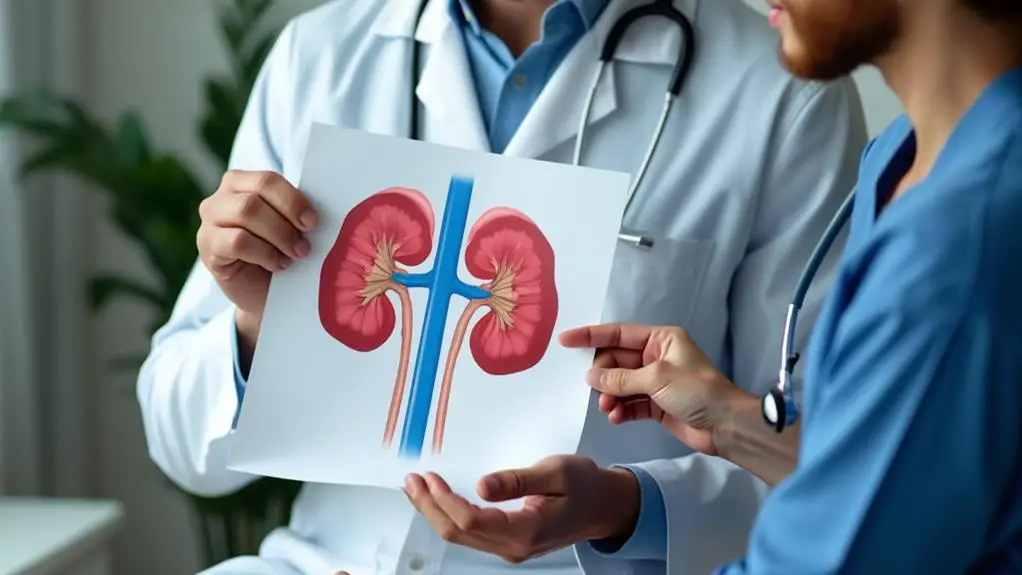
Consulting healthcare professionals, such as nephrologists or registered dietitians, is vital before initiating a ketogenic diet, particularly for individuals with pre-existing kidney conditions or those at risk for kidney disease.
These experts provide essential guidance and personalized recommendations to guarantee that dietary adjustments align with individual health needs. Regular kidney function tests should be conducted to monitor any potential impacts of the keto diet on renal health.
Healthcare providers can offer strategies that help balance macronutrient intake while considering specific kidney health needs, including:
- Hydration strategies: Proper fluid intake is critical to reduce the risk of kidney stones and maintain overall kidney function.
- Nutritional education: Managing potassium and phosphorus levels is vital for individuals with advanced kidney disease on a keto diet.
- Tailored dietary plans: Individualized approaches from dietitians guarantee that the diet supports kidney health while achieving ketogenic goals.
- Monitoring and adjustments: Continuous assessment and adjustments of the diet based on regular kidney function tests.
- Risk management: Identifying and managing potential risks associated with the keto diet for those with kidney concerns.
Frequently Asked Questions
How Can I Do Keto Without Hurting My Kidneys?
To maintain kidney health on a keto diet, limit protein intake, guarantee adequate hydration, monitor potassium and phosphorus levels, incorporate non-starchy vegetables, and regularly consult a healthcare provider for personalized guidance and function monitoring.
Is Keto Hard on the Kidneys?
Yes, keto effects can be hard on kidney function, particularly in individuals with pre-existing conditions. High protein intake increases acid load and calcium excretion, potentially worsening kidney health. Proper hydration and monitoring are essential for mitigating risks.
What Foods Help Repair Kidneys?
Kidney friendly foods include nutrient rich options like berries, spinach, kale, and fatty fish. These foods reduce oxidative stress and inflammation, support kidney function, and maintain electrolyte balance, contributing to overall kidney health and repair.
How to Prevent Kidney Stones While on a Keto Diet?
To prevent kidney stones, emphasize hydration importance to dilute urine and reduce stone-forming substances. Monitor and limit high-oxalate foods, and maintain adequate calcium intake to bind oxalate in the digestive tract, reducing absorption and stone risk.
Conclusion
Adhering to a keto diet requires careful attention to kidney health through adequate hydration, moderated protein intake, and balanced electrolytes. Individuals, particularly those with chronic kidney disease, must remain vigilant about potential risks, such as kidney stones and electrolyte imbalances. Regular kidney monitoring and consultation with healthcare professionals are essential to mitigate these risks and guarantee a safe dietary regimen. Adopting these practices can support kidney function while adhering to a ketogenic lifestyle.
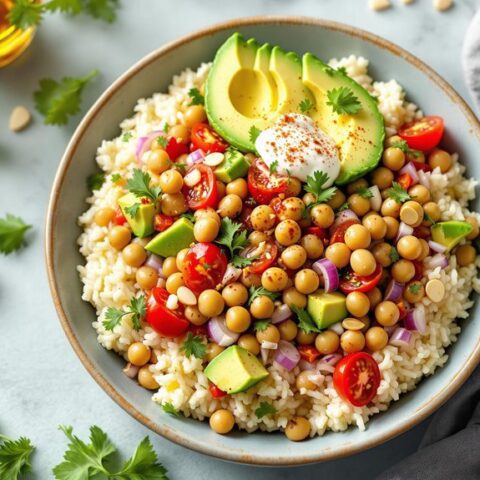
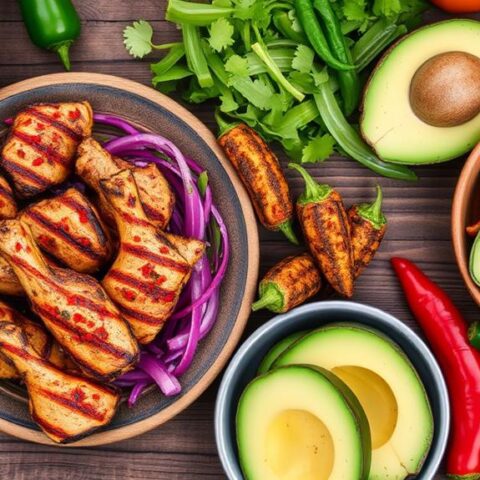








No Comments